France descends into political chaos as Prime Minister François Bayrou loses confidence vote today
The French government has fallen with 364 deputies voting against Mr Bayrou, with only 194 voting in his favour. Of 573 politicians who voted, 15 in total abstained from voting entirely.
‘The Prime Minister must submit the government’s resignation to the President of the Republic,’ declared National Assembly President Yaël Braun-Pivet, who adjourned the session.
It comes after he warned against his failing country on making the same mistakes as Britain as it tried to dig itself out of a financial crisis.
The embattled 74-year-old spoke only hours before a self-imposed parliamentary No Confidence vote this evening – one that he was almost certain to lose.
As he made an attempt to save his crumbling career, Mr Bayrou warned that France could become like Britain if it taxed the rich to solve its debt crisis.
‘The rich will simply move away’, he warned, adding: ‘They have numerous countries where they can find tax refuge in Europe itself, such as Luxembourg, Belgium, and the Netherlands for businesses.’
Citing UK policies as a cautionary tale, Mr Bayoru said: ‘Our British neighbours decided to tax foreigners who were exempt from taxation.
‘Those foreigners moved away, and the immediate consequence was an explosion in property prices in Milan.’
Mr Bayrou said France was in a ‘life-threatening condition’ that risked ‘enslaving our youth’ due to its mountain of debt, which is nearing £3trillion.
‘You can get rid of the government, but you can’t get rid of reality,’ he added.
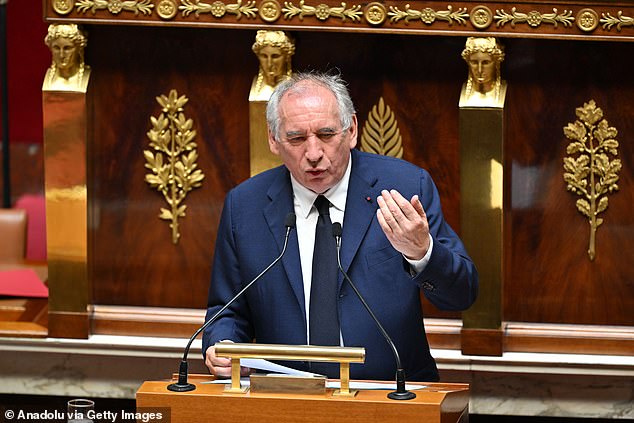
Chaos-riven Prime Minister François Bayrou warned France to not make the same mistakes as Britain as it tried to dig itself out of a financial crisis
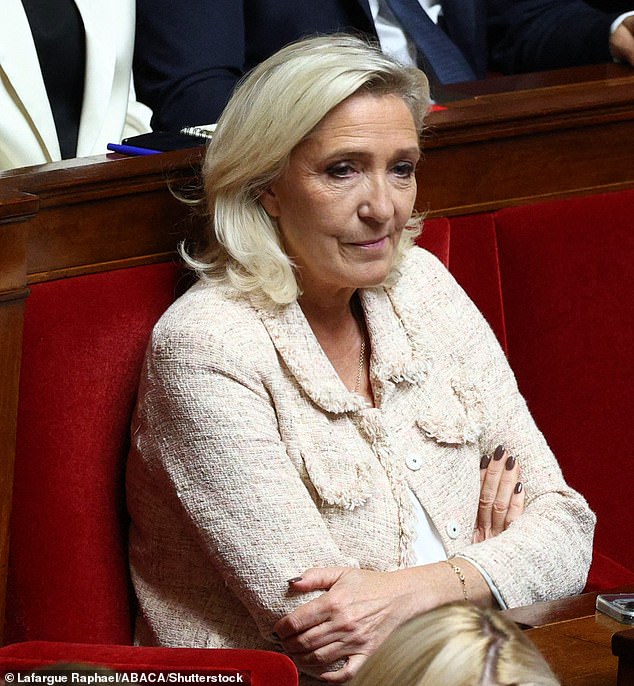
Marine Le Pen watches on as the Prime Minister delivers his speech hours before a self-imposed Parliamentary No Confidence vote
‘France has not known a balanced budget for 51 years. Every year, debt accumulates,’ he said.
If, as expected, Mr Bayrou does go today, it will be the first time in the history of the 5th Republic that an incumbent PM has lost his job in such a humiliating manner.
Bayrou’s departure also means that President Emmanuel Macron has gone through six prime ministers in less than nine years.
Macron himself is now facing calls for his resignation, as millions prepare to take part in strikes and street marches in a ‘Block Everything’ protest.
A leaked Paris police note has warned of potential ‘violent actions, sabotage and operations against strategic sectors of the economy’.
It could be a repeat of the Gilet Jaunes (Yellow Vests) insurrection that caused chaos towards the beginning of Macron’s administration, from 2018.
Protesters have discussed blocking trains, picketing oil refineries and walking out of major supermarkets without paying, with unions also calling for mass demonstrations on September 18.
Mr Macron could call for new parliamentary elections if Mr Bayrou loses his job, but they are likely to end in another hung parliament.
In the meantime, Marine Le Pen and Jorgan Bardella’s National Rally – the largest party in the National Assembly with 123 seats – believes it can achieve a workable majority with allies.
The Left, meanwhile, has formed a ‘Republican Vote’ to keep the far-Right Rally out of power.
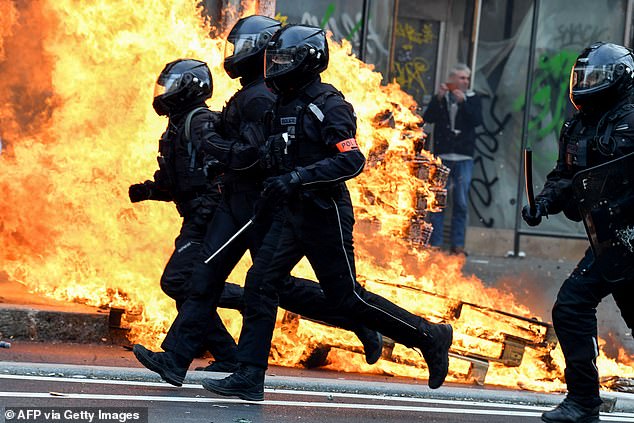
French riot police run past a fire during a demonstration in Paris on March 23, 2023
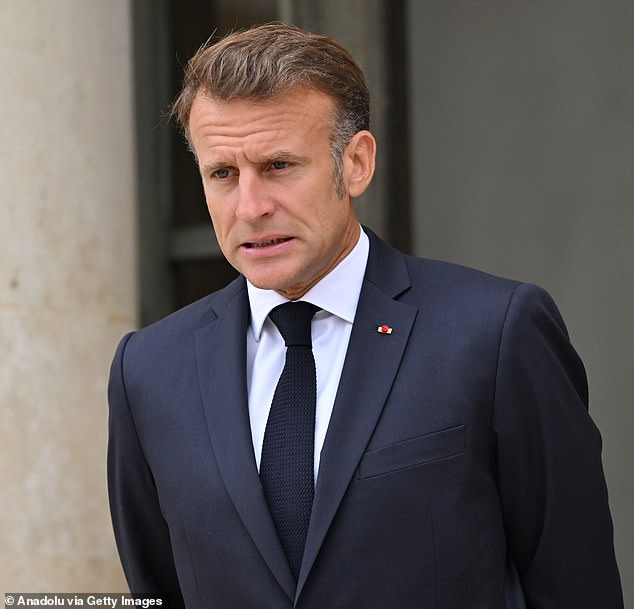
The government’s almost inevitable breakdown comes as approval ratings for French President Emmanuel Macron plummet to a record low, with 77 percent of the nation not approving of his work
Many have called for the deeply unpopular Emmanuel Macron to resign, but he is under no obligation to quit.
However, in 2027, the President will be forced to step down, after he has completely two terms of office – the maximum allowed in France.
It comes as the heavily divided French parliament is set to oust its second Prime Minister in a year in a no-confidence vote, plunging the country into political chaos.
The government’s almost inevitable breakdown comes as popularity for French President Emmanuel Macron plummets to a record low, with 77 percent of the nation not approving of his work and 64 percent calling for his resignation.
French MPs will debate a vote of no confidence in prime minister Francois Bayrou inside Paris’s Assemblée Nationale after just nine months of him in office – a move which will most likely result in the country facing its fifth prime minister in less than two years.
Bayrou blindsided even his allies by calling a confidence vote to end a months-long standoff over his austerity budget, which foresees almost 44 billion euros (£38.19 billion) of cost savings to reduce France‘s debt pile.
He has warned that there was a ‘high risk of disorder and chaos’ if MPs failed to back his budget, describing the nation’s spiralling national debt as ‘a terribly dangerous period… a time of hesitation and turmoil’.
But Marine Le Pen, the leader of the hard-right National Rally party, said Bayrou was committing ‘political suicide’.
Opposition parties across the board have made it clear they will vote against his minority government, making it highly improbable he will get enough backing to survive – he needs a majority of the 577 MPs in the National Assembly.
Bayrou will become the second French prime minister in succession to have suffered such a fate after Michel Barnier was ejected in December after only three months in office.
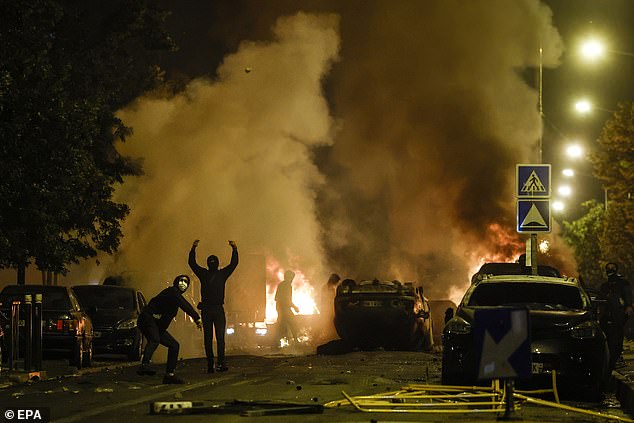
Protesters clash with riot police in Nanterre, near Paris, France, 29 June 2023. Violence broke out after police fatally shot a 17-year-old during a traffic stop in Nanterre on 27 June 2023
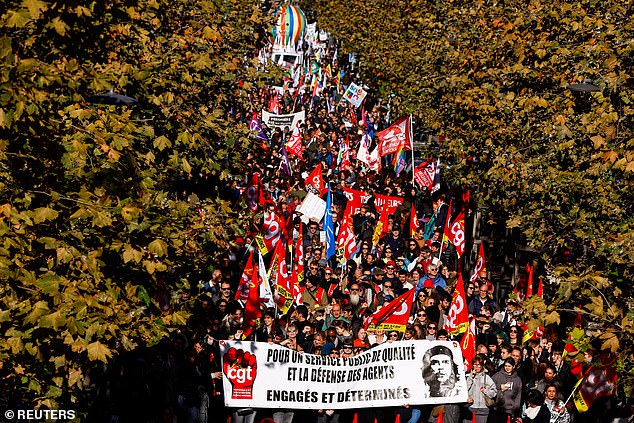
Protesters hold a banner that reads ‘For a quality public service and the defense of civil servants’ during a demonstration by French civil servants as part of a national day of strikes by public sector workers, in Marseille, France, December 5, 2024
Bayrou, the sixth prime minister under Macron since 2017, has given no indication in days of TV interviews that he expects to survive the vote.
Instead, he has asked: ‘Has our country understood the seriousness of the situation it finds itself in?’
He is expected to address parliament in a final bid for support from 1300 GMT with the vote awaited from 1700 GMT.
After the vote, Macron will face one of the most critical decisions of his presidency: appointing the seventh prime minister of his mandate to thrash out a compromise, or call snap elections in a bid to have a more accommodating parliament.
The president is spearheading European efforts to end Russia’s war on Ukraine, boosting his international profile.
But polling at home does not make pretty reading, and he is forbidden from standing a third time in 2027.
According to a poll by Odoxa-Backbone for Le Figaro newspaper, 64 percent of French want Macron to resign rather than name a new prime minister, a move he has explicitly ruled out.
Some 77 percent of people do not approve of his work, Macron’s worst ever such rating, according to an Ifop poll for the Ouest-France daily.
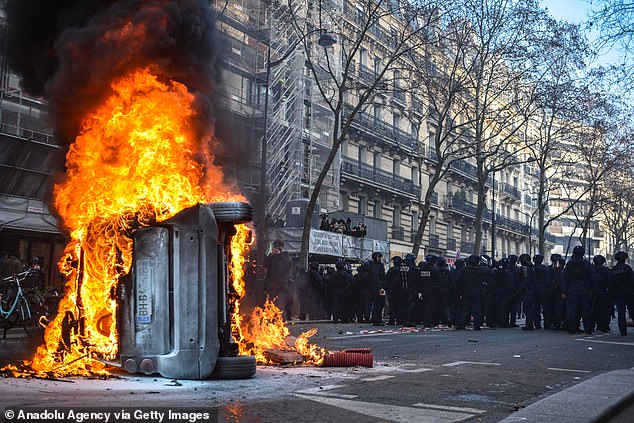
Clashes with riot police take place during a rally against French President’s plan to raise the legal retirement age from 62 to 64 in Paris, on February 11, 2023
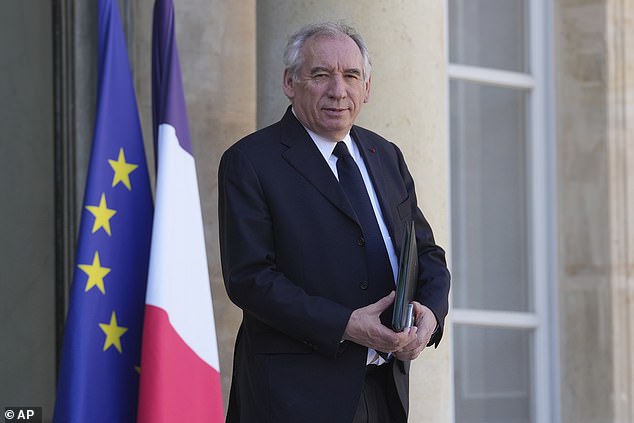
French MPs will debate a vote of no confidence in prime minister Francois Bayrou inside Paris’s Assemblée Nationale after just nine months of him in office
Addressing the crisis after an international summit on Ukraine, Macron called on French political forces on Thursday to demonstrate ‘responsibility’ and ensure ‘stability’.
‘The reshaping of the world is changing many things for our Europe. In this context, France must continue to move forward,’ he said.
But alongside political upheavals, France is also facing social tension.
A left-wing collective calling itself ‘Block Everything’ is calling for a day of action on September 10 and trade unions have urged workers to strike on September 18.
There is no guarantee an election would result in any improvement in the fortunes of Macron’s centre-right bloc in parliament.
But there are signs that the president could be eyeing cooperation with the Socialist Party (PS), a one time giant of French politics that has fallen into the doldrums in recent years.
At a meeting Tuesday of the centrist parties that support him, Macron urged them to ‘work with the Socialists’, a participant said, asking not to be named. All those present were opposed to snap elections, the person added.
Socialist leader Olivier Faure has made no secret of his readiness to take the post of prime minister, even producing his own draft budget.
But Socialist backing would not automatically attract support from other left-wing forces.
‘It would be workable if the Socialist Party says: ‘We’re overthrowing the alliance and governing with the central bloc,” said a close associate of Macron, adding that for now the president is keeping his cards close to his chest.
The government’s collapse looks set to deepen France’s paralysis at a critical time for Europe, which is seeking unity in the face of Russia’s war against Ukraine, an increasingly dominant China and trade tensions with the United States.
The turmoil also threatens France’s ability to rein in its debt, with the risk of further credit downgrades looming as bond spreads – a gauge of the risk premium investors demand to hold French debt – widen.
France faces acute pressure to repair its finances, with last year’s deficit nearly double the EU’s 3% limit of economic output and public debt at 113.9% of GDP.












